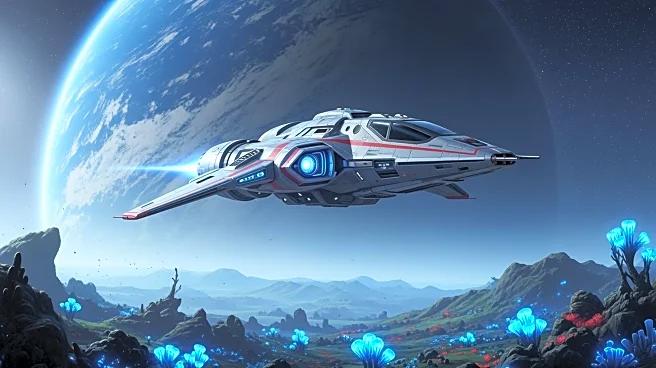What's Happening?
Bruce Nesmith, a former systems designer at Bethesda, has shared his views on why Starfield did not achieve the same level of success as other Bethesda RPG franchises like Fallout and The Elder Scrolls. Nesmith, who left Bethesda in 2021, praised Starfield as a good
game but noted it did not reach the heights of its predecessors. He suggested that the expectations set by Bethesda's previous titles contributed to the game's reception. Nesmith also pointed out that the procedural generation in Starfield led to less exciting planetary exploration, and the lack of enemy variety was a drawback. Despite these criticisms, Bethesda plans to release additional story DLC for Starfield, and there are reports of potential future availability on PlayStation 5 and Nintendo Switch 2.
Why It's Important?
The critique from a former Bethesda designer highlights the challenges faced by game developers in meeting high expectations set by previous successful titles. Starfield's reception could impact Bethesda's reputation and influence future game development strategies, particularly in how they approach space-themed games. The feedback on procedural generation and enemy variety may guide future improvements and updates. Additionally, the potential expansion to other gaming platforms could broaden Starfield's audience and improve its market performance.
What's Next?
Bethesda's confirmation of additional story DLC for Starfield indicates ongoing support and development for the game. The potential release on PlayStation 5 and Nintendo Switch 2 could attract new players and increase sales. The feedback from Nesmith and the gaming community may lead to adjustments in future updates or influence the design of upcoming Bethesda titles. Stakeholders, including players and investors, will be watching closely to see how Bethesda addresses these critiques and adapts its strategies.
Beyond the Headlines
Nesmith's comments reflect broader industry challenges in balancing innovation with player expectations. The reliance on procedural generation in games like Starfield raises questions about the trade-offs between expansive worlds and engaging content. The critique also underscores the importance of diverse enemy design in maintaining player interest. As Bethesda continues to develop Starfield and other titles, these insights may shape the company's approach to game design and storytelling.















